- Home
- Virginia Woolf
The Common Reader Page 4
The Common Reader Read online
Page 4
Rend us in sunder, though cans’t not divide,
Our bodies so, but that our souls are ty’d,
And we can love by letters still and gifts,
And thoughts and dreams20;
Again,
They who one another keepe alive
N’er parted be.21
And again,
So to one neutrall thing both sexes fit,
Wee dye and rise the same, and prove
Mysterious by this love.22
Such hints and premonitions of a further and finer state urge him on and condemn him to perpetual unrest and dissatisfaction with the present. He is tantalised by the sense that there is a miracle beyond any of these transient delights and disgusts. Lovers can, if only for a short space, reach a state of unity beyond time, beyond sex, beyond the body. And at last, for one moment, they reach it’. In the ‘Extasie’ they lie together on a bank.
All day, the same our postures were,
And wee said nothing, all the day …23
This Extasie doth unperplex
(We said) and tell us what we love,
Wee see by this, it was not sexe,
Wee see, we saw not what did move: …24
Wee then, who are this new soule, know,
Of what we are compos’d, and made,
For, th’ Atomies of which we grow,
Are soules, whom no change can invade.
But O alas, so long, so farre
Our bodies, why doe wee forbeare? …25
But O alas, he breaks off, and the words remind us that however much we may wish to keep Donne in one posture – for it is in these Extasies that lines of pure poetry suddenly flow as if liquefied by a great heat – so to remain in one posture was against his nature. Perhaps it is against the nature of things also. Donne snatches the intensity because he is aware of the change that must alter, of the discord that must interrupt.
Circumstances, at any rate, put it beyond his power to maintain that ecstasy for long. He had married secretly; he was a father; he was, as we are soon reminded, a very poor yet a very ambitious man, living in a damp little house at Mitcham with a family of small children. The children were frequently ill. They cried, and their cries, cutting through the thin walls of the jerry-built house, disturbed him at his work. He sought sanctuary naturally enough elsewhere, and naturally had to pay rent for that relief. Great ladies – Lady Bedford, Lady Huntingdon, Mrs Herbert26 – with well-spread tables and fair gardens, must be conciliated; rich men with the gift of rooms in their possession must be placated. Thus, after Donne the harsh satirist, and Donne the imperious lover, comes the servile and obsequious figure of Donne the devout servant of the great, the extravagant eulogist of little girls. And our relationship with him suddenly changes. In the satires and the love poems there was a quality – some psychological intensity and complexity – that brings him closer than his contemporaries, who often seem to be caught up in a different world from ours and to exist immune from our perplexities and swept by passions which we admire but cannot feel. Easy as it is to exaggerate affinities, still we may claim to be akin to Donne in our readiness to admit contrasts, in our desire for openness, in that psychological intricacy which the novelists have taught us with their slow, subtle, and analytic prose. But now, as we follow Donne in his progress, he leaves us in the lurch. He becomes more remote, inaccessible, and obsolete than any of the Elizabethans. It is as if the spirit of the age, which he had scorned and flouted, suddenly asserted itself and made this rebel its slave. And as we lose sight of the outspoken young man who hated society, and of the passionate lover, seeking some mysterious unity with his love and finding it miraculously, now here, now there, it is natural to abuse the system of patrons and patronage that thus seduced the most incorruptible of men. Yet it may be that we are too hasty. Every writer has an audience in view, and it may well be doubted if the Bedfords and the Drurys and the Herberts were worse influences than the libraries and the newspaper proprietors who fill the office of patron nowadays.
The comparison, it is true, presents great difficulties. The noble ladies who brought so strange an element into Donne’s poetry, live only in the reflection, or in the distortion, that we find in the poems themselves. The age of memoirs and letter-writing was still to come. If they wrote themselves, and it is said that both Lady Pembroke27 and Lady Bedford were poets of merit, they did not dare to put their names to what they wrote, and it has vanished. But a diary here and there survives from which we may see the patroness more closely and less romantically. Lady Ann Clifford, for example, the daughter of a Clifford and a Russell, though active and practical and little educated – she was not allowed ‘to learn any language because her father would not permit it’28 – felt, we can gather from the bald statements of her diary, a duty towards literature and to the makers of it as her mother, the patroness of the poet Daniel,29 had done before her. A great heiress, infected with all the passion of her age for lands and houses, busied with all the cares of wealth and property, she still read good English books as naturally as she ate good beef and mutton. She read The Faery Queen and Sidney’s Arcadia; she acted in Ben Jonson’s Masques at Court; and it is proof of the respect in which reading was held that a girl of fashion should be able to read an old corrupt poet like Chaucer without feeling that she was making herself a target for ridicule as a blue-stocking. The habit was part of a normal and well-bred life. It persisted even when she was mistress of one estate and claimant to even vaster possession of her own. She had Montaigne read aloud to her as she sat stitching at Knole30; she sat absorbed in Chaucer while her husband worked. Later, when years of strife and loneliness had saddened her, she returned to her Chaucer with a deep sigh of content: ‘…if I had not excellent Chaucer’s book here to comfort me’, she wrote, ‘I were in a pitiable case having as many troubles as I have here, but, when I read in that, I scorn and make light of them all, and a little part of his beauteous spirit infuses itself in me’.31 The woman who said that, though she never attempted to set up a salon or to found a library, felt it incumbent on her to respect the men of low birth and no fortune who could write The Canterbury Tales or The Faery Queen. Donne preached before her at Knole. It was she who paid for the first monument to Spenser in Westminster Abbey, and if, when she raised a tomb to her old tutor, she dwelt largely upon her own virtues and titles, she still acknowledged that even so great a lady as herself owed gratitude to the makers of books. Words from great writers nailed to the walls of the room in which she sat, eternally transacting business, surrounded her as she worked, as they surrounded Montaigne in his tower in Burgundy.
Thus we may infer that Donne’s relation to the Countess of Bedford was very different from any that could exist between a poet and a countess at the present time. There was something distant and ceremonious about it. To him she was ‘as a vertuous Prince farre off’.32 The greatness of her office inspired reverence apart from her personality, just as the rewards within her gift inspired humility. He was her Laureate, and his songs in her praise were rewarded by invitations to stay with her at Twickenham and by those friendly meetings with men in power which were so effective in furthering the career of an ambitious man – and Donne was highly ambitious, not indeed for the fame of a poet, but for the power of a statesman. Thus when we read that Lady Bedford was ‘God’s Masterpiece’,33 that she excelled all women in all ages, we realise that John Donne is not writing to Lucy Bedford; Poetry is saluting Rank. And this distance served to inspire reason rather than passion. Lady Bedford must have been a very clever woman, well versed in the finer shades of theology, to derive an instant or an intoxicating pleasure from the praises of her servant. Indeed, the extreme subtlety and erudition of Donne’s poems to his patrons seems to show that one effect of writing for such an audience is to exaggerate the poet’s ingenuity. What is not poetry but something tortured and difficult will prove to the patron that the poet is exerting his skill on her behalf. Then again, a learned poem can be handed round among statesmen and men of affairs to prove that the poet is no mere versifier, but capable of office and responsibility. But a change of inspiration that has killed many poets – witness Tennyson and the Idylls of the King – only stimulated another side of Donne’s manysided nature and many-faceted brain. As we read the long poems written ostensibly in praise of Lady Bedford, or in celebration of Elizabeth Drury (An Anatomie of the World and the Progresse of the Soul),34 we are made to reflect how much remains for a poet to write about when the season of love is over. When May and June are passed, most poets cease to write or sing the songs of their youth out of tune. But Donne survived the perils of middle age by virtue of the acuteness and ardour of his intellect. When ‘the satyrique fires which urg’d me to have writt in skorne of all’35 were quenched, when ‘My muse (for I had one), because I’m cold, Divorced herself,36 there still remained the power to turn upon the nature of things and dissect that. Even in the passionate days of youth Donne had been a thinking poet. He had dissected and analysed his own love. To turn from that to the anatomy of the world, from the personal to the impersonal, was the natural development of a complex nature. And the new angle to which his mind now pointed under the influence of middle age and traffic with the world, released powers that were held in check when they were directed against some particular courtier or some particular woman. Now his imagination, as if freed from impediment, goes rocketing up in flights of extravagant exaggeration. True, the rocket bursts; it scatters in a shower of minute, separate particles – curious speculations, wire-drawn comparisons, obsolete erudition; but, winged by the double pressure of mind and heart, of reason and imagination, it soars far and fast into a finer air. Working himself up by his own extravagant praise of the dead girl, he shoots on:
We spur, we reine the s
tarres, and in their race
They’re diversly content t’obey our pace.
But keepes the earth her round proportion still?
Doth not a Tenarif, or higher Hill
Rise so high like a Rocke, that one might thinke
The floating Moone would shipwracke there, and sinke?
Seas are so deepe, that Whales being strooke to day,
Perchance tomorrow, scarce at middle way
Of their wish’d journies end, the bottome, die.
And men, to sound depths, so much line untie,
As one might justly thinke, that there would rise
At end thereof, one of th’ Antipodies:37
Or again, Elizabeth Drury is dead and her soul has escaped:
she stayes not in the ayre,
To looke what Meteors there themselves prepare;
She carries no desire to know, nor sense,
Whether th’ayres middle region be intense;
For th’Element of fire, she doth not know,
Whether she past by such a place or no;
She baits not at the Moone, nor cares to trie
Whether in that new world, men live, and die.
Venus retards her not, to’enquire, how shee
Can, (being one starre) Hesper, and Vesper bee;
Hee that charm’d Argus eyes, sweet Mercury,
Workes not on her, who now is growne all eye; 38
So we penetrate into distant regions, and reach rare and remote speculations a million miles removed from the simple girl whose death fired the explosion. But to break off fragments from poems whose virtue lies in their close-knit sinews and their long-breathed strength is to diminish them. They need to be read currently rather to grasp the energy and power of the whole than to admire those separate lines which Donne suddenly strikes to illumine the stages of our long climb.
Thus, finally, we reach the last section of the book, the Holy Sonnets and Divine Poems. Again the poetry changes with the change of circumstances and of years. The patron has gone with the need of patronage. Lady Bedford has been replaced by a Prince still more virtuous and still more remote. To Him the prosperous, the important, the famous Dean of St Paul’s now turns. But how different is the divine poetry of this great dignitary from the divine poetry of the Herberts and the Vaughans! The memory of his sins returns to him as he writes. He has been burnt with ‘lust and envy’39; he has followed profane loves; he has been scornful and fickle and passionate and servile and ambitious. He has attained his end; but he is weaker and worse than the horse or the bull. Now too he is lonely. ‘Since she whom I lov’d’ is dead ‘My good is dead.’40 Now at last his mind is ‘wholly sett on heavenly things’. And yet how could Donne – that ‘little world made cunningly of elements’41 – be wholly set on any one thing?
Oh, to vex me, contraryes meet in one:
Inconstancy unnaturally hath begott
A constant habit; that when I would not
I change in vowes, and in devotione.42
It was impossible for the poet who had noted so curiously the flow and change of human life, and its contrasts, who was at once so inquisitive of knowledge and so sceptical –
Doubt wisely; in strange way,
To stand inquiring right, is not to stray;
To sleep, or run wrong, is43
– who had owned allegiance to so many great Princes, the body, the King, the Church of England, to reach that state of wholeness and certainty which poets of purer life were able to maintain. His devotions themselves were feverish and fitful. ‘My devout fitts come and goe away like a fantastique Ague.’44 They are full of contraries and agonies. Just as his love poetry at its most sensual will suddenly reveal the desire for a transcendent unity ‘beyond the Hee and Shee’,45 and his most reverential letters to great ladies will suddenly become love poems addressed by an amorous man to a woman of flesh and blood, so these last divine poems are poems of climbing and falling, of incongruous clamours and solemnities, as if the church door opened on the uproar of the street. That perhaps is why they still excite interest and disgust, contempt and admiration. For the Dean still retained the incorrigible curiosity of his youth. The temptation to speak the truth in defiance of the world even when he had taken all that the world had to give, still worked in him. An obstinate interest in the nature of his own sensations still troubled his age and broke its repose as it had troubled his youth and made him the most vigorous of satirists and the most passionate of lovers. There was no rest, no end, no solution even at the height of fame and on the edge of the grave for a nature plaited together of such diverse strands. The famous preparations that he made, lying in his shroud, being carved for his tomb, when he felt death approach are poles asunder from the falling asleep of the tired and content. He must still cut a figure and still stand erect – a warning perhaps, a portent certainly, but always consciously and conspicuously himself. That, finally, is one of the reasons why we still seek out Donne; why after three hundred years and more we still hear the sound of his voice speaking across the ages so distinctly. It may be true that when from curiosity we come to cut up and ‘survey each part’, we are like the doctors and ‘know not why’46 – we cannot see how so many different qualities meet together in one man. But we have only to read him, to submit to the sound of that passionate and penetrating voice, and his figure rises again across the waste of the years more erect, more imperious, more inscrutable than any of his time. Even the elements seem to have respected that identity. When the fire of London destroyed almost every other monument in St Paul’s, it left Donne’s figure untouched, as if the flames themselves found that knot too hard to undo, that riddle too difficult to read, and that figure too entirely itself to turn to common clay.
‘THE COUNTESS OF PEMBROKE’S ARCADIA’
If it is true that there are books written to escape from the present moment, and its meanness and its sordidity, it is certainly true that readers are familiar with a corresponding mood. To draw the blinds and shut the door, to muffle the noises of the street and shade the glare and flicker of its lights – that is our desire. There is then a charm even in the look of the great volumes that have sunk, like the ‘Countess of Pembroke’s Arcadia’, as if by their own weight down to the very bottom of the shelf. We like to feel that the present is not all; that other hands have been before us, smoothing the leather until the corners are rounded and blunt, turning the pages until they are yellow and dog’s-eared. We like to summon before us the ghosts of those old readers who have read their Arcadia from this very copy – Richard Porter, reading with the splendours of the Elizabethans in his eyes; Lucy Baxter, reading in the licentious days of the Restoration; Thos. Hake, still reading, though now the eighteenth century has dawned with a distinction that shows itself in the upright elegance of his signature. Each has read differently, with the insight and the blindness of his own generation. Our reading will be equally partial. In 1930 we shall miss a great deal that was obvious to 1655; we shall see some things that the eighteenth century ignored. But let us keep up the long succession of readers; let us in our turn bring the insight and the blindness of our own generation to bear upon the ‘Countess of Pembroke’s Arcadia’, and so pass it on to our successors.
If we choose the Arcadia because we wish to escape, certainly the first impression of the book is that Sidney wrote it with very much the same intention: ‘. . . it is done only for you, only to you’, he tells his ‘dear lady and sister, the Countess of Pembroke’. 1 He is not looking at what is before him here at Wilton; he is not thinking of his own troubles or of the tempestuous mood of the great Queen in London. He is absenting himself from the present and its strife. He is writing merely to amuse his sister, not for ‘severer eyes’. ‘Your dear self can best witness the manner, being done in loose sheets of Paper, most of it in your presence, the rest, by sheets sent unto you, as fast as they were done.’2 So, sitting at Wilton under the downs with Lady Pembroke, he gazes far away into a beautiful land which he calls Arcadia. It is a land of fair valleys and fertile pastures, where the houses are ‘lodges of yellow stone built in the form of a star’3; where the inhabitants are either great princes or humble shepherds; where the only business is to love and to adventure; where bears and lions surprise nymphs bathing in fields red with roses; where princesses are immured in the huts of shepherds; where disguise is perpetually necessary; where the shepherd is really a prince and the woman a man; where, in short, anything may be and happen except what actually is and happens here in England in the year 1580. It is easy to see why, as Sidney handed these dream pages to his sister, he smiled, entreating her indulgence. ‘Read it then at your idle times, and the follies your good judgment will find in it, blame not, but laugh at.’4 Even for the Sidneys and the Pembrokes life was not quite like that. And yet the life that we invent, the stories we tell, as we sink back with half-shut eyes and pour forth our irresponsible dreams, have perhaps some wild beauty; some eager energy; we often reveal in them the distorted and decorated image of what we soberly and secretly desire. Thus the Arcadia, by wilfully flouting all contact with the fact, gains another reality. When Sidney hinted that his friends would like the book for its writer’s sake, he meant perhaps that they would find there something that he could say in no other form, as the shepherds singing by the river’s side will ‘deliver out, sometimes joys, sometimes lamentations, sometimes challengings one of the other, sometimes, under hidden forms, uttering such matters as otherwise they durst not deal with’.5 There may be under the disguise of the Arcadia a real man trying to speak privately about something that is close to his heart. But in the first freshness of the early pages the disguise itself is enough to enchant us. We find ourselves with shepherds in spring on those sands which ‘lie against the Island of Cithera’.6
Then, behold, something floats on the waters. It is the body of a man, and he grasps to his breast a small square coffer; and he is young and beautiful – ‘though he were naked, his nakedness was to him an apparel’ 7; and his name is Musidorus; and he has lost his friend. So, warbling melodiously, the shepherds revive the youth, and row out in a bark from the haven in search of Pyrocles; and a stain appears on the sea, with sparks and smoke issuing from it. For the ship upon which the two princes Musidorus and Pyrocles were voyaging has caught fire; it floats blazing on the water with a great store of rich things round it, and many drowned bodies. ‘In sum, a defeat, where the conquered kept both field and spoil: a shipwrack without storm or ill footing: and a waste of fire in the midst of the water.’8

 Three Guineas
Three Guineas Flush
Flush Mrs. Dalloway
Mrs. Dalloway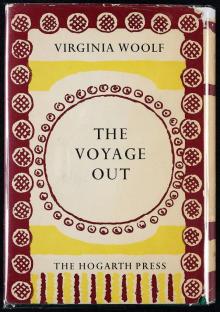 The Voyage Out
The Voyage Out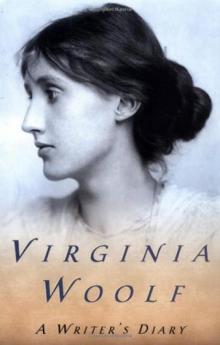 A Writer's Diary: Being Extracts From the Diary of Virginia Woolf
A Writer's Diary: Being Extracts From the Diary of Virginia Woolf To The Lighthouse
To The Lighthouse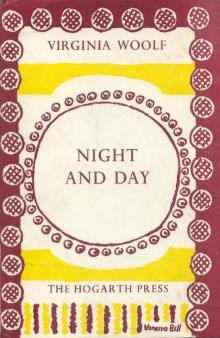 Night and Day
Night and Day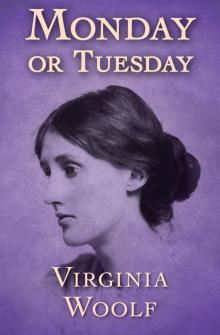 Monday or Tuesday
Monday or Tuesday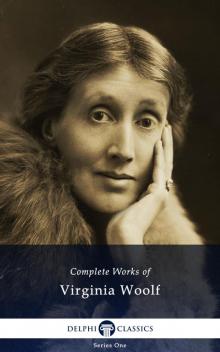 Complete Works of Virginia Woolf
Complete Works of Virginia Woolf Orlando
Orlando Genius and Ink
Genius and Ink Mrs. Dalloway (Annotated)
Mrs. Dalloway (Annotated) Jacob's Room
Jacob's Room THE RUSSIAN POINT OF VIEW
THE RUSSIAN POINT OF VIEW A Writer's Diary
A Writer's Diary Woolf Short Stories
Woolf Short Stories